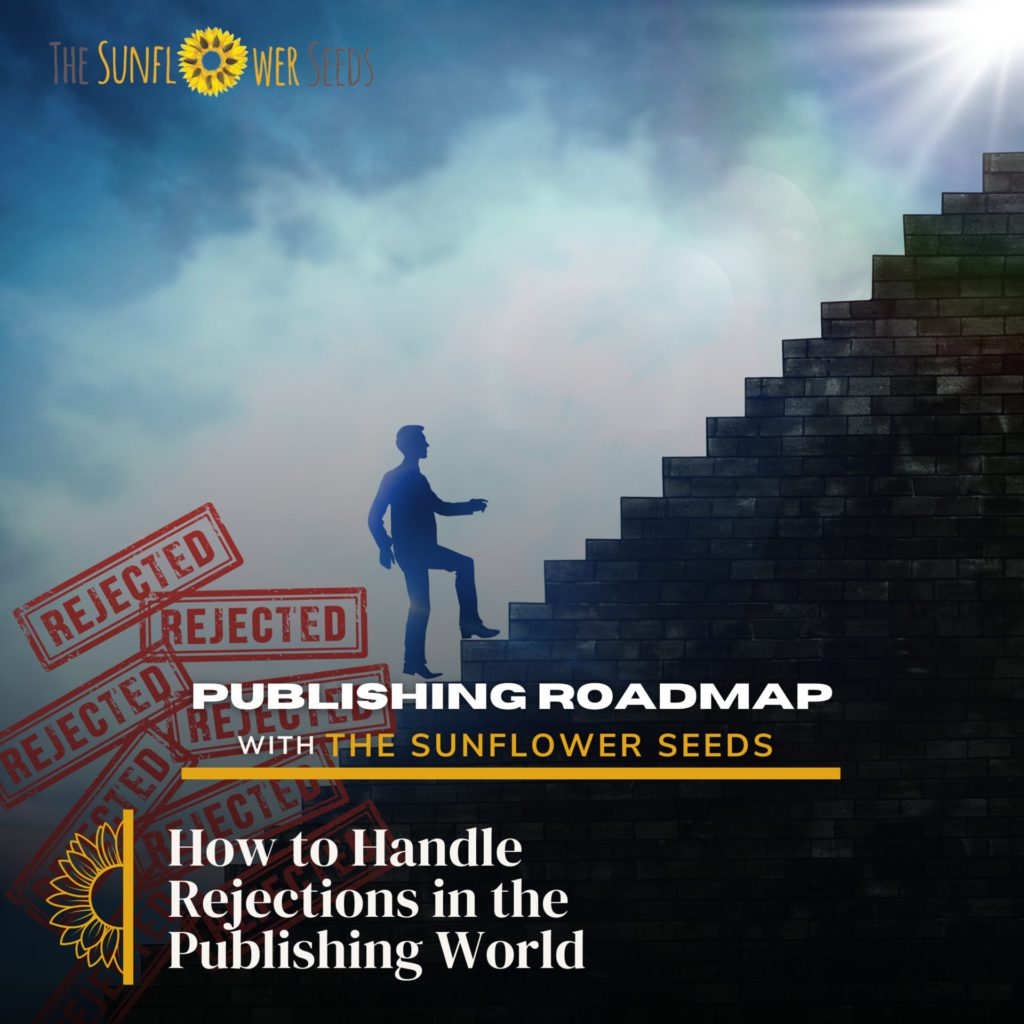How to Handle Rejections in the Publishing World: A Writer’s Guide
“Success is the ability of going from one failure to another with no loss of enthusiasm.”
— Winston Churchill

Rejection is an inevitable part of every writer’s journey, but that doesn’t make it any easier to handle. Whether it’s a literary agent declining your manuscript, a publisher passing on your book, or lukewarm reader feedback, rejection can feel discouraging. But here’s the truth—every bestselling author has faced rejection before finding success. From J.K. Rowling’s Harry Potter being turned down by 12 publishers to Stephen King’s Carrie being rejected multiple times, even literary legends have experienced setbacks. The key to overcoming rejection isn’t avoiding it—it’s learning how to navigate it, grow from it, and use it as fuel to improve your craft.
At The Sunflower Seeds, we work closely with aspiring and experienced authors, guiding them through every stage of their publishing journey, including rejection. We help writers refine their manuscripts, improve their book marketing strategies, and find the best route to publication—whether through self-publishing, traditional publishing, or hybrid solutions. If you’ve been wondering, “How do I handle rejection as a writer?” or “What should I do if a publisher rejects my book?”, this guide will help you turn setbacks into opportunities for growth.
Why Do Publishers and Literary Agents Reject Manuscripts?
One of the most frustrating parts of rejection is not knowing why it happened. While a generic rejection letter may not provide specific feedback, there are common reasons why publishers and agents pass on a manuscript. Sometimes, it’s about market trends—publishing houses receive thousands of submissions, and if your book doesn’t align with their current interests, it may get rejected despite its quality. Other times, the manuscript might need more work in terms of structure, pacing, or character development.
Rejections can also be a result of poor query letters. If you haven’t tailored your pitch to the agent or publisher you’re submitting to, they may not see the value in your story. Additionally, if your book falls into a genre that is oversaturated, standing out can be a challenge. Understanding these reasons helps writers refine their submissions and increase their chances of acceptance in the future. At The Sunflower Seeds, we assist authors in crafting compelling query letters, researching market trends, and polishing their manuscripts before submission to maximize their chances of success.
How Do Successful Writers Overcome Rejection?
Rejection isn’t the end of your writing career—it’s part of the process. Many authors who are now household names once faced repeated rejection. J.K. Rowling was told that Harry Potter was “too long” for a children’s book. Agatha Christie’s work was rejected for five years before she finally secured a publishing deal. Even literary classics like Lord of the Flies by William Golding faced over 20 rejections.
The difference between writers who give up and those who succeed lies in persistence. Every rejection is an opportunity to learn, improve, and refine your approach. Writers who treat rejection as feedback rather than failure have a much higher chance of eventually getting published. Seeking constructive criticism, working with an editor, and resubmitting your work are all essential steps in overcoming rejection. At The Sunflower Seeds, we encourage writers to view rejection as a stepping stone rather than a roadblock, offering expert guidance to help them improve their manuscripts and submissions.
How Can Writers Use Rejection to Improve Their Craft?
Every piece of feedback—whether from an agent, publisher, or beta reader—is a valuable tool for growth. Instead of seeing rejection as a personal failure, use it as an opportunity to analyze what can be improved. If you receive a form rejection letter, it may not provide much insight, but a personalized rejection with notes means the agent or publisher saw potential in your work. Take their suggestions seriously, whether they relate to pacing, character development, or plot structure.
Revising your manuscript based on feedback can significantly enhance its quality. Join a writer’s community where you can exchange critiques with other authors to gain fresh perspectives. Writing workshops, editorial consultations, and professional manuscript assessments can help you identify weaknesses and refine your storytelling. At The Sunflower Seeds, we offer manuscript reviews, beta reading services, and feedback sessions to help writers enhance their work before resubmitting to publishers or considering self-publishing.
Should You Consider Self-Publishing After Rejection?
Many authors who face multiple rejections from traditional publishers turn to self-publishing, and for good reason. Platforms like Amazon Kindle Direct Publishing (KDP), IngramSpark, and Draft2Digital have made it easier than ever to publish a book without waiting for a traditional publisher’s approval. While self-publishing requires authors to handle their own book marketing and distribution, it also offers higher royalties and complete creative control.
Self-published authors like E.L. James (Fifty Shades of Grey) and Andy Weir (The Martian) started by independently releasing their books before gaining mainstream success. If you believe in your work and are willing to put in the effort to market it effectively, self-publishing can be a viable and rewarding path. At The Sunflower Seeds, we help authors navigate the self-publishing process, from cover design to book marketing strategies, ensuring their work reaches the right audience.
How Can You Stay Motivated After Rejection?
Rejection can be discouraging, but staying motivated is crucial to your success as a writer. Surround yourself with a supportive writing community—whether through local writing groups, online forums, or mentorship programs. Hearing other writers’ experiences with rejection and success can be incredibly inspiring.
Setting small, achievable goals can also help keep you focused. Instead of dwelling on one rejection, aim to submit to multiple agents and publishers. Keep refining your manuscript and query letter based on the feedback you receive. It’s also essential to remind yourself why you started writing in the first place. Your passion for storytelling should be the driving force that keeps you going, no matter how many setbacks you face.
At The Sunflower Seeds, we provide ongoing support to writers, offering motivation, guidance, and practical tools to keep their publishing journey on track. Whether you need help with manuscript revisions, book marketing, or finding the right publishing route, our team is here to ensure you stay on the path to success.
Why Rejection Is Just Another Step Toward Success?
Rejection is a natural part of the publishing world, but it should never be the reason you give up on your writing dreams. Every “NO” you receive brings you closer to the right opportunity, whether that’s through improving your manuscript, refining your pitch, or choosing an alternative publishing route. The most successful authors have faced rejection, learned from it, and persisted until they found their place in the literary world.
At The Sunflower Seeds, we believe that rejection isn’t the end—it’s a beginning. With expert guidance, professional feedback, and a supportive writing community, you can turn setbacks into stepping stones toward your success. Whether you’re pursuing traditional publishing, considering self-publishing, or exploring hybrid options, we’re here to help you every step of the way. If you’re ready to transform rejection into motivation and move forward with confidence, contact The Sunflower Seeds today and take the next step in your writing journey.
A creative book cover can also turn the “No” into a “Yes”. Learn “How to Create an Engaging Book Cover that Sells.”





